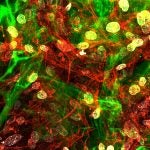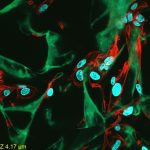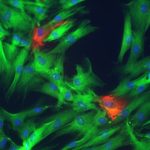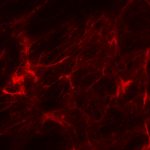Multipotent stromal cells/mesenchymal stem cells (MSCs) are a key cell type in the field of regenerative medicine. These cells are isolated from different tissues, and may comprise a heterogeneous cell population that may also change due to cell expansion.
In many tissues, MSCs correspond in situ with perivascular cells (adventitial fibroblasts and pericytes). In the bone marrow, MSCs are also related to skeletal stem and progenitor cells and stromal cells that support hematopoietic stem cells (the stem cell niche).
MSCs proliferate extensively ex vivo and, after implantation, present low immunogenicity, allowing both autologous and allogeneic uses. Therefore, many cellular therapies explore the potential of MSCs: these cells can robustly differentiate into cells such as osteoblasts (that precipitate calcium to make bone), allowing their use as replacement for damaged tissue, while many other clinical applications rely on their production and release of paracrine signals with chemotactic, immunomodulatory, and pro-angiogenic activity.
Based on recombinant DNA techniques, molecular biology and biochemistry, we primary work altering gene expression of human MSC to either optimize their therapeutic potential for applications such as bone repair, non-healing ulcers and critical limb ischemias, or to understand the basic mechanisms involved in differentiation, proliferation, migration, self-renewal, etc. We also use non-genetic approaches to improve MSC-based applications, such as pre-conditioning strategies (with hypoxia or cytokines) and glycoengineering of the cells.
In recent years, we have also studied human SSCs. Publications on this subject are coming soon!





